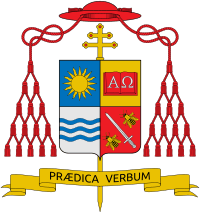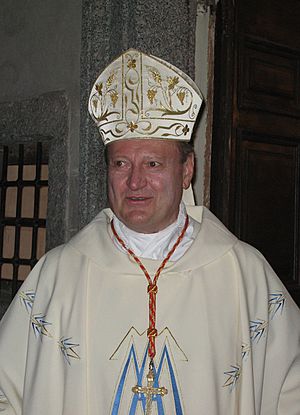Gianfranco Ravasi facts for kids
Quick facts for kids His Eminence Gianfranco Ravasi |
|
|---|---|
| President of the Pontifical Council for Culture | |

Cardinal Ravasi in 2018
|
|
| Appointed | 3 September 2007 |
| Reign ended | 5 June 2022 |
| Predecessor | Paul Poupard |
| Successor | Office abolished |
| Other posts |
|
| Orders | |
| Ordination | 28 June 1966 |
| Consecration | 29 September 2007 by Pope Benedict XVI |
| Created Cardinal | 20 November 2010 |
| Rank |
|
| Personal details | |
| Birth name | Gianfranco Ravasi |
| Born | 18 October 1942 Merate, Italy |
| Nationality | Italian |
| Denomination | Roman Catholic |
| Previous post |
|
| Alma mater | Archiepiscopal seminary of Milan Pontifical Gregorian University Pontifical Biblical Institute |
| Motto | Praedica Verbum ("Preach the Word") — 2 Timothy 4:2 |
| Signature | |
| Coat of arms |  |
| Styles of Gianfranco Ravasi |
|
|---|---|
 |
|
| Reference style | His Eminence |
| Spoken style | Your Eminence |
| Informal style | Cardinal |
Gianfranco Ravasi (born 18 October 1942) is an Italian prelate (a high-ranking church official) and an expert on the Bible. He became a Cardinal, one of the most important leaders in the Catholic Church, in 2010. For many years, from 2007 to 2022, he was the President of the Pontifical Council for Culture, a group that helps the Church connect with modern culture. Before that, he was in charge of Milan's famous Ambrosian Library.
Contents
Biography
Growing Up in Italy
Gianfranco Ravasi was born in Merate, Italy, and was the oldest of three children. His father was an anti-fascist, meaning he opposed Italy's government during World War II. His father served in the army but left and took 18 months to get back to his family. Ravasi later said this experience shaped him. "My search has always been for something permanent," he said, explaining that he looks for things that last. His mother was a schoolteacher.
Education and Early Career
At first, Ravasi wanted to be a teacher of ancient Greek and Latin. However, he later decided to become a priest. He studied at a seminary in Milan and was ordained as a priest on 28 June 1966. He continued his studies in Rome and also spent summers in countries like Syria and Jordan working as an archaeologist.
He became a professor, teaching about the Old Testament at a university in Milan. From 1989 to 2007, he was the head of the Ambrosian Library, a historic library with many important books and manuscripts. During this time, he became well-known for giving popular talks about religion.
Working for the Pope
The Roman Curia is the group of offices that helps the Pope lead the Catholic Church. In 2007, Pope Benedict XVI asked Ravasi to come to Rome to lead several important groups, including the Pontifical Council for Culture. He was also made an archbishop.
In 2010, he was made a Cardinal-Deacon, a high honor in the Church. He was one of the cardinals who voted in the 2013 conclave that elected Pope Francis.
As a leader in culture, Cardinal Ravasi organized the Vatican's part in the Venice Biennale, a famous international art show, in 2013. He asked artists to create works about "Creation, De-Creation and Re-Creation" to start a conversation between art and faith.
In 2017, he created a special group of 37 women to advise the Council for Culture. He said their job was to give real feedback and share their unique points of view on topics like science and technology.
Ideas and Beliefs
Talking with Everyone
Cardinal Ravasi believes it is important for religious people to talk with those who are not sure about their beliefs, like agnostics and atheists. He wanted to create a space where people could discuss big questions about life, such as good and evil, love, and suffering.
Connecting with Modern Culture
Ravasi is known for using references from modern culture in his speeches and messages. On his Twitter account, he has shared quotes from writers like Shakespeare and Mark Twain, and even musicians like Lou Reed and David Bowie. He believes the Church needs to communicate in ways that are interesting and easy to understand, even in a 140-character tweet.
Science and Faith
Ravasi has said that the theory of evolution can be compatible with the Bible and the teachings of the Church. He pointed out that the Church has never condemned Charles Darwin or his famous book, On the Origin of Species.
Importance of Archaeology
Having worked as an archaeologist, Ravasi believes it is a very important field. He said that archaeology helps us understand that "man did not start from zero, but is always building upon his patrimony, his heritage." It shows us how we are connected to the people who came before us.
Religious Freedom
In a 2013 speech, Ravasi said that religious liberty is a basic human right that must be respected. He noted that even in modern countries, there are subtle ways that this freedom can be limited. He believes that in a world where many cultures and religions live side-by-side, respecting each other's beliefs is necessary for peace and progress.
See also
 In Spanish: Gianfranco Ravasi para niños
In Spanish: Gianfranco Ravasi para niños
 | Dorothy Vaughan |
 | Charles Henry Turner |
 | Hildrus Poindexter |
 | Henry Cecil McBay |


